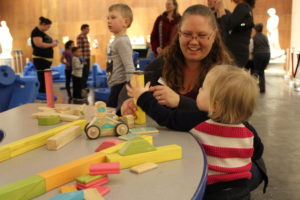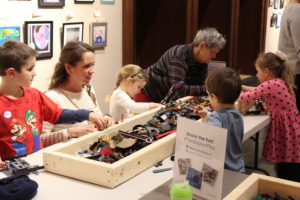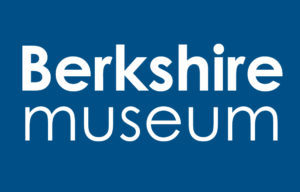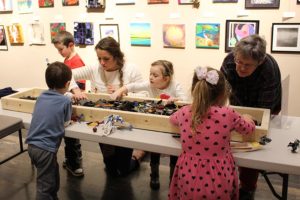Program Overview
The Berkshire Museum has run Ten Days of Play during February vacation week for the past several years. This drop-in program is all about fun and play. It is multi-outcome and open-ended, promoting creative play through multiple modes with simple materials. Families are greeted briefly by a facilitator, and then the fun begins as kids start to play right away. Activities give children the freedom to play in an unstructured way, allowing them to build, create, and even destroy their designs. In the first version of Ten Days of Play, facilitators put out tape and cardboard boxes, but they eventually moved to giant blue blocks from Imagination Playground, magnetic wooden blocks from Tegu, wooden architectural pieces called Bilderhoos, and Legos.
Program Facilitation
Facilitators assist children but don’t play a lead role; instead they let the children take the reins. In the same way, facilitators establish a multi-user expectation by encouraging parents and caregivers to engage with their children and join in the play. They can play a supporting role and still help make their child’s creative outlet a reality. For example, if a child builds a “lemonade stand” out of big blocks, the grown-up can play the role of a thirsty customer. If a caregiver is off to the side not paying attention to their children, facilitators use gentle cues that encourage conversation and invite adults to participate with their children. For example, a facilitator might ask “I see your kid is making a seesaw; do you have a playground in your backyard or near your house?” or “What was your favorite thing to do as a kid?” This person-to-person conversation helps the adult re-engage with their child’s play, and helps them to remember what it was like to be a kid. In addition, the Museum provides takeaway cards with tips for visiting the Museum, and a simple handout to get adults engaged.

At the beginning of each day, facilitators will start some examples for kids to build off of. This inspiration is helpful to kids who might feel intimidated or not know where to start. Families spend an average of 2 hours in the play space, and will often come back more than once during the school vacation week. What they learn at the Museum is relevant to their lives and translates to what happens at home: one family told Museum staff that the exploration of concepts at the Museum led to the kids building on those concepts at home.
Importance of Child-Directed Play
Facilitators like to remind adults that messy is okay when it comes to a child’s play. It may look like chaos, but it makes sense to them, and it’s important for their development. The Museum also provides tips for parents for what to do at home to encourage child-directed play. (See article.) The goal of Ten Days of Play is provide a safe space for kids to play with the support of their parents and caregivers. It is all about letting children lead and set the guidelines. Ten Days of Play promotes creativity, and gives kids an opportunity to use their imagination.

Fun and Play Can Happen Anywhere
The Berkshire Museum is an art, history, and natural science museum, not a children’s museum. However, this didn’t stop them from offering a program that may be new for a traditional art or history museum. The Museum recognized a need for creative and fun play opportunities for families, and Ten Days of Play has become the Museum’s centerpiece program. Any museum can promote fun and play, just try to be distinctive to your institution and content.
Special thanks to Craig Langlois, Director of Education and Public Programs, Berkshire Museum http://berkshiremuseum.org/

Other organizations to check out:
KaBOOM! is the national non-profit dedicated to bringing balanced and active play into the daily lives of all kids, particularly those growing up in poverty in America. https://kaboom.org/
